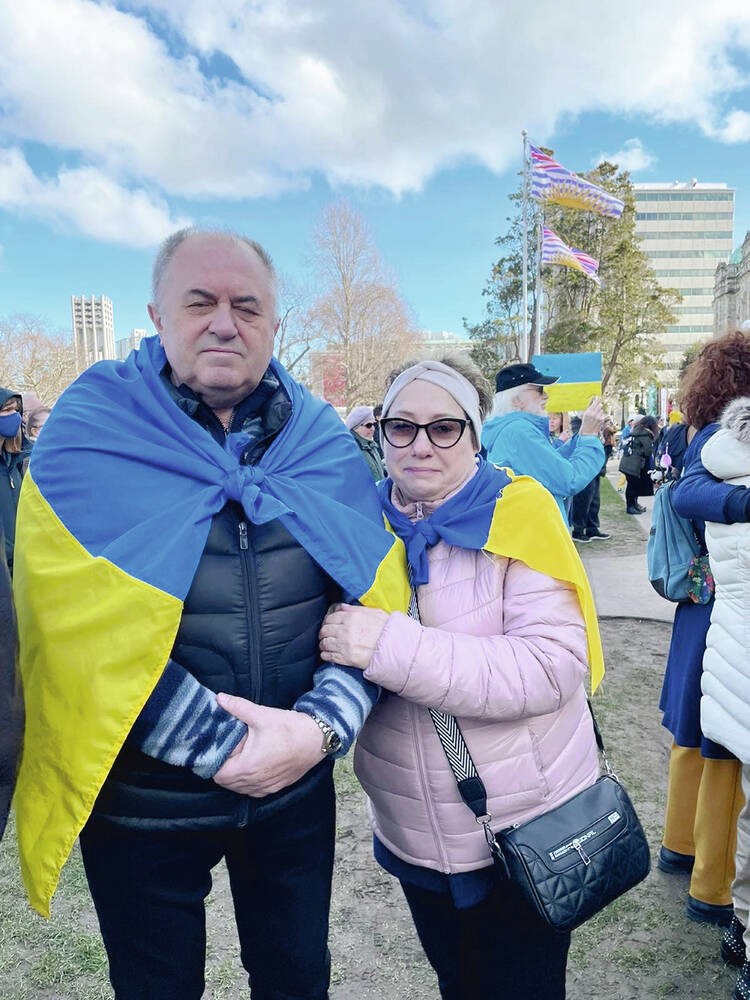Valentyna Fabrikova and Sergii Fabrikov are among the lucky ones — or, at least, are less unlucky than all the Ukrainians left homeless by war, wondering where they’ll go next.
The couple landed in Victoria on Saturday, having fled their home in Odesa with a single bag each. The bus trip to Moldova, usually two or three hours, took almost 10.
But at least the couple, in their 60s, didn’t have to cross the border on foot in sub-freezing temperatures, as did many others. And at least their application for a Canadian tourist visa had already been in the works before the invasion, meaning it wasn’t too hard to fly to Victoria, where son Andriy Fabrikov and family awaited.
“It was a very tough road,” Andriy said Tuesday. His parents are safe here, but sometimes tear up when watching the news. Andriy’s brother remains in Ukraine, as the law says men of conscription age — 18 to 60 — must do.
Other Vancouver Island families can only wait anxiously, hoping displaced Ukrainian friends and relatives will be able to escape the madness. Canada promised two weeks ago that it would open its doors, but it takes more than an announcement of good intentions to make that happen. There are the nuts and bolts to work out.
“We still need to see the details from the federal government,” says Victoria immigration lawyer Benton Mischuk. An associate with Maynard Kischer Stojicevic, he is one of two dozen lawyers offering advice pro bono as part of a Canadian Bar Association initiative to help Ukrainians seeking shelter in Canada.
Mischuk is particularly eager for the feds to reveal, perhaps Thursday, the specifics of an emergency-travel authorization that would allow Ukrainians to skip visa requirements.
Ottawa has also said it will let Ukrainians apply for work permits while in Canada and to get jobs here while their permits are being processed. Canada also says it will make it easier for Ukrainians to stay here, whether by extending temporary residency or offering a path to citizenship.
Again, though, it’s not simply a matter of waving a wand. Logistics must be worked out. Even before the exodus from Ukraine, Canadian immigration authorities were overwhelmed by a combination of pandemic-related logjams and the challenge of extracting refugees from Afghanistan.
There’s also the matter of how to help Ukrainians after they arrive. Housing is tight. Kids will need schooling. Some will need help dealing with trauma. “Three weeks ago, they were deciding which movie to go to, and now they’re living out of a backpack,” notes Jean McRae, CEO of the Inter-Cultural Association of Greater Victoria.
McRae points to one particular hurdle: Normally, refugees arrive here with permanent-resident status, having gone through a lengthy vetting process during the months or years they spent stranded outside their homelands.
Only those with such status qualify for refugee services — language programs, help with settlement — funded by the federal government. Will McRae’s organization, which offers such services, be able to offer them to Ukrainians who arrive here without officially being labelled as refugees?
The good news: There’s already a pretty solid support system waiting. More than 600 people in the capital region speak Ukrainian as a mother tongue. Another 755 have some knowledge of the language and more than 20,000 have Ukrainian heritage. Note that Ukrainehelpvi.ca, the new go-to website for all things Ukrainian on the Island, has a form that those wishing to take in refugees can fill out.
Also, Canada is a country long used to absorbing newcomers. Ours is a nation of immigrants. One in five of us was born elsewhere. Even if you’re native-born, it’s likely that your grandparents had an accent from somewhere else.
Actual refugees — those driven here by war or persecution — might make up a tiny slice of the immigrant pie, but our history as a safe haven predates Canada itself. Loyalists fleeing the American Revolution migrated here in the late eighteenth century. So did Scots chased out by the Highland Clearances.
A quarter-million refugees arrived after the Second World War. Canada welcomed more than 37,000 Hungarians after the failed uprising of 1956 and 11,000 Czechoslovakians after the Prague Spring turned to winter in 1968.
The 1970s saw the arrival of post-Allende Chileans, Bengali Muslims uprooted by the war in Bangladesh and Ugandan Asians ousted by Idi Amin. Prior to the influx of Syrians — 69,000 of them between November 2015 and October 2019 —the most high-profile wave washed ashore around 1980, when Canada embraced more than 60,000 Vietnamese boat people. As of last month, 7,550 Afghans had made it here safely.
And now it’s Andriy Fabrikov’s parents’ turn. Fabrikov, who immigrated six years ago, says his parents are willing to work.
His dad used English while running his ship-repair yard in Odesa, so he has a decent grasp on the language. Imagine being in their shoes, starting over. Imagine being in Ukraine, hoping you get the chance.



